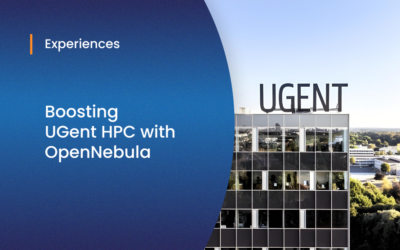An increasing number of Scientific Computing centers are beginning to provide their resources to users through the IaaS model since it allows for efficient management and an easy reallocation of the computational resources. Large experimental collaborations in the High Energy Physics community, which heavily depend on grid-based distributed computing, are also beginning to explore the Cloud paradigm, in order to integrate it into their complex computing and data models.
As an example, at the Torino computing center of the Italian National Institute for Nuclear Physics (INFN), we are using OpenNebula since 2011 to provide computing resources to the ALICE experiment at the CERN Large Hadron Collider in Geneva, to the BESIII experiment at the Institute of High Energy Physics (IHEP) of the Chinese Academy of Science in Beijing, and to a growing number of other applications. Besides managing the site and participating in EU-funded R&D projects like INDIGO-DataCloud, we have an ongoing collaboration with the IHEP Computer Centre and the BESIII Collaboration to evolve the experiment’s computing from a Grid-based model to a Cloud-base one.
It is thus important to train a number of young researchers, spreading Cloud Computing knowledge across the physics computing community. It is in this context that we organized the 2015 BESIIICGEM Cloud Computing Summer School, aimed to provide a full introduction both to basic and more advanced concepts of Cloud Computing.
“BESIIICGEM” is an EU-funded project within the “Horizon 2020” Research and Innovation Framework Programme. Its primary aim is the design and construction of an innovative particle detector for BES-III, a high-energy physics experiment run by an international collaboration and hosted at IHEP in Beijing. Among its different Work Packages, dealing with the different demanding tasks needed to achieve such a goal, specific activity is devoted to R&D in HPC and Cloud Computing. The school is one of its outreach and dissemination activities. The School is jointly organized by the BESIIICGEM Consortium, IHEP, and INFN, and will be hosted by IHEP in Beijing from Monday, 7th to Friday, 11th September 2015.
The School will complement a more theoretical set of morning lectures with a full hands-on approach in the afternoons, when each (small) group of students will deploy at the end of the week a working testbed, one for each group. The reference middleware stack of choice for the practical activities will be OpenNebula, chosen for its simplicity and our experience in its use for scientific computing use cases.
The School is aimed at Doctoral Students in the High Energy or Nuclear Physics fields or in the IT and Computing fields. Young researchers holding Post-Doctoral positions are encouraged to apply as well.
The detailed agenda of the school is being finalized; updated information can be easily found on the School’s web-site.



0 Comments